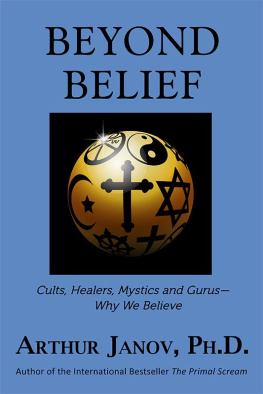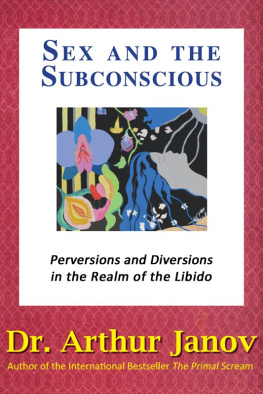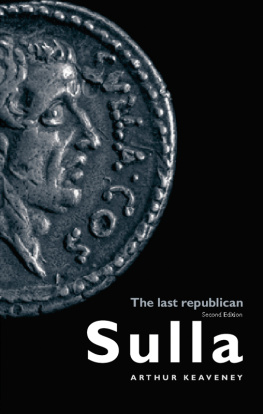Arthur Janov - Beyond Belief
Here you can read online Arthur Janov - Beyond Belief full text of the book (entire story) in english for free. Download pdf and epub, get meaning, cover and reviews about this ebook. year: 2016, publisher: Reputation Books, genre: Religion. Description of the work, (preface) as well as reviews are available. Best literature library LitArk.com created for fans of good reading and offers a wide selection of genres:
Romance novel
Science fiction
Adventure
Detective
Science
History
Home and family
Prose
Art
Politics
Computer
Non-fiction
Religion
Business
Children
Humor
Choose a favorite category and find really read worthwhile books. Enjoy immersion in the world of imagination, feel the emotions of the characters or learn something new for yourself, make an fascinating discovery.
- Book:Beyond Belief
- Author:
- Publisher:Reputation Books
- Genre:
- Year:2016
- Rating:5 / 5
- Favourites:Add to favourites
- Your mark:
- 100
- 1
- 2
- 3
- 4
- 5
Beyond Belief: summary, description and annotation
We offer to read an annotation, description, summary or preface (depends on what the author of the book "Beyond Belief" wrote himself). If you haven't found the necessary information about the book — write in the comments, we will try to find it.
Beyond Belief — read online for free the complete book (whole text) full work
Below is the text of the book, divided by pages. System saving the place of the last page read, allows you to conveniently read the book "Beyond Belief" online for free, without having to search again every time where you left off. Put a bookmark, and you can go to the page where you finished reading at any time.
Font size:
Interval:
Bookmark:

BEYOND BELIEF
Cults, Healers, Mystics and GurusWhy We Believe
Arthur Janov, Ph.D.
Reputation Books
BEYOND BELIEF
Published by Reputation Books, LLC
reputationbooksllc.com
Copyright 2016 by Arthur Janov, Ph.D. All rights reserved.
No part of this book may be used or reproduced in any manner whatsoever without the written permission from Reputation Books, except in the case of brief quotations embodied in critical articles and reviews. For information, contact the publisher at reputationbooks@gmail.com.
Book Design by Lisa Abellera
eBook Design by Mary C. Moore
ISBN 978-0-9862031-7-6 (paperback)
ISBN 978-0-9862031-8-3 (eBook)
First Edition: May 2016
10 9 8 7 6 5 4 3 2 1
CONTENTS
Individuals whose agonies have no rhyme or reason, whose barely contained desperation impels them to search for magic, badly need bearers of good tidings. Enter the Dr. Feelgoods, who promise hope against hopelessness, help against helplessness, whose incantations calm, soothe and relieve.
We seem to need gurus and magicians to heal our wounds, offer company to stave off loneliness, and give direction to those of us who have lost our way. We seek guides whose lure of mystery and the mystical offer hope of something new, who will miraculously transform and liberate us, change our lives radically without effort or pain. Instant transformation is the seekers catchwordthe adoption of beliefs, attitudes and philosophies that will resolve neuroses, unlock the secrets of the universe, push us toward a higher consciousness, help us discover nirvana, and take us out of pain, even when that pain is unacknowledged, and above all, offers us peace of mind. Though few of us know what it is, most of us seek it. If only they knew that peace of mind is just a few millimeters down in the brain.
Tragic events like the confrontation in Waco, Texas in 1993, the mass suicides in Jonestown, Guyana in 1979, and Heavens Gate, Rancho Santa Fe in 1997 draw our attention to the potentially fatal consequences of belief. The followers of Jim Jones, at his behest, drank poison en masse, believing they would meet later in some otherworldly utopia. Likewise, the Branch Dravidians, or disciples of David Koresh, were roasted alive at Apocalypse Ranch, believing (from their messiahs harangues) the Bible had prophesied their fiery end and that they would meet again in heaven. Marshall Herff Applewhite appointed himself the extraterrestrial shepherd who was to lead the chosen aboard a spaceship into eternity by committing suicide. Eighteen male members of the cult who died had been surgically castrated, including Applewhite. And last but not least, the Arab suicide bombers who willingly blow themselves to pieces for an idea. It is reported that recruiting stations for these bombers have a long waiting list. The examples above all follow quite constricted behaviors with nauseatingly similar results. Understanding one of these groups helps us understand all others, in the same way that understanding one brain helps us understand all other brains.
Much has been written about the psychology and power of charismatic leaders (Jones, Koresh, Hitler, Pol Pot, Khomeini, Bin Laden, Muqtada al-Sadr), armed with mesmerizing ideologies, who have captured the imaginations (and futures) of small groups of people or whole nations. We need to know more about those lost, obedient souls who embrace belief systems so fiercely as to override their human instinct for survival. Are these people dying for an idea? Or is the idea a rationale for a death wish? What is it about an idea that allows one to give up ones life? Are ideas so powerful as to override survival instincts? Where are ideas located in the brain and how do they get there? How do unconscious feelings get trans-formed into beliefs? What kind of feelings lead to what kind of beliefs? I intend to answer these questions, not so much as to analyze and dissect various belief systems, but to see how ideas themselves function in the psychic economyhow beliefs become defenses to literally block unconsciously imprinted pain. I do not intend to do an analysis of the various Middle Eastern countries and their various religious sects. That is the subject matter for social psychologists and political historians. There are in those sects a multitude of factors, not the least of which are cultural, educational and mystical.
My task is to find out how ideas come into being, how they suppress feelings, and how they absorb the force of needs and feelings. Who are the great believers among us, and how did they get that way? Where do ideas get their fanatical force that leads someone to kill others or themselves? Where is the force or tenacity of those ideas located and how did they get so strong? I shall attempt to answer all of those questions. Once we understand how one belief system sets in, we will have a good idea how any belief system is encased, because despite the widely disparate content their function is often identical.
We will learn how instincts and needs are transmuted into feelings, which are then transposed into ideas, and how those transposed ideas have the force of basic needs and feelings behind them, gathering up history on their route to the intellectual, ideational, the verbal and conceptual. They remain unyielding and unchanging because they are not just ideas but something far more basic to survivalanchored into deep brain structures that do not lend themselves easily into change; nor should they, as what they are anchored into are often survival functions.
Tenacious defensive ideas, it turns out, are the effluvia of deep feelings imprinted into our systems. Below those feelings lie raw energy that supplies valence or force to ideas and can make them lethal. Throughout this work when I write about cults and belief systems it is in the sense of ideas as defenses. It is not my intention to dissect many different ideas and beliefs, but rather, to investigate how those ideas take hold in the brain.
The brain doesnt care what the content of a belief system is so long as it exists. It can be Zen, Allah, God or the Republican Partythe force is there to keep us hooked. Again, the brain doesnt judge itself nor second-guess its content; it just produces the ideas that it needsGod is watching over me and will protect me. Does that mean all ideas are superficial and simply transposed feelings with little validity of their own? Not at all. But if we dont understand that ideas are built out of a structure, from a lower level of the unconscious, we shall never learn how to combat or change them. To remain in the realm of ideas alone is to lie in the domain of philosophy.
Ideas that are in accord with ones feelingsthe environment is being pollutedis not what I shall be discussing because then we would have to analyze the validity of the idea: Are hot-house gases increasing, for example? Indeed, we recently treated a woman at the Primal Center obsessed with pollution; she would throw fits if someone smoked near her, a seemingly logical response, but it came out of a feeling that I would never dare to interpret on my ownthere were toxic drugs given to her mother at birth, and also the mother smoked and drank during her pregnancy. The newborn sensed that her world was polluted. This remained unconscious until she relived her birth and felt all the toxins surrounding her. She knew immediately the cause of her overreaction in the present. That understanding, however, did not invalidate her beliefs. Again, it is not my intention to validate or invalidate anyones beliefs; I simply want to show how they help us cope in the world.
As I pointed out, the brain doesnt care about what idea we have so long as we have them, and that the idea brings reliefhope against hopelessness, courage against fear, life against death, having someone there who listens to us instead of feeling totally alone in an indifferent universe. When we feel hopelesswhen we have lost our best friend and life seems so drearywe can appeal to an idea of someone or something that will help out. The idea may even keep us from killing ourselves. We can imagine a help and a love from a deity that never existed in our early lives; that imagination will work for the brain. Neurons (brain cells) do not distinguish between a good idea, a real idea and a false one. With pain, nerve cells go to work immediately calming it; they manufacture painkilling chemicals such as serotonin, and allow the force of the pain to be diverted into higher left-brain areas that are in charge of beliefs. It is an automatic process commanded by and servile to ones painful feelings.
Next pageFont size:
Interval:
Bookmark:
Similar books «Beyond Belief»
Look at similar books to Beyond Belief. We have selected literature similar in name and meaning in the hope of providing readers with more options to find new, interesting, not yet read works.
Discussion, reviews of the book Beyond Belief and just readers' own opinions. Leave your comments, write what you think about the work, its meaning or the main characters. Specify what exactly you liked and what you didn't like, and why you think so.











